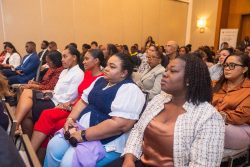Dear Editor,
The constitution, laws, international conventions and charters are sacred instruments that must be respected in spirit and intent. Every government and elected official is expected to lead by example in upholding these instruments. The current back and forth about it only being possible to achieve national unity if the opposition is in the cabinet ‒ referred to as executive power-sharing ‒ is either lacking in respect for universal principles and instruments which are expected to guide the day-to-day business of this nation, or demeaning to our intelligence as a people.
The issue of freedom of association that brings with it the right to elect or appoint person(s) of choice to represent your interests is a universal fundamental right enshrined at Article 147 in the Guyana Constitution. The protection from discrimination for exercising such association or being so identified in a particular group, which is another universal fundamental right, is also protected in Article 149 of the constitution.
The citizens on 11th May 2015 expressed their confidence in who they wanted to administer their affairs at various levels in the nation’s management. As such they chose APNU+AFC to manage the executive; and the APNU+AFC and PPP/C to deliberate and make decisions in Parliament, which is the nation’s highest decision-making forum. In the Regional Democratic Councils the citizens have decided that the PPP/C and APNU+AFC will be given the authority to lead and manage the affairs of various regions, while respecting the right to dissent and other fundamental rights and freedoms of every individual.
Article 13, which speaks to “inclusionary democracy” as the nation’s “principal political objective” has been enshrined in the constitution since 2001. The current opposition, which was in the government when the amendment was made did nothing to make real the spirit and intent of the article. Today Hydar Ally of the PPP, a man who defended the intransigence of the previous government, is calling for a “government of national unity” as the way forward.
This brings into question whether some politicians have any regard for the people and the laws safeguarding their well-being, or whether their statements are merely in furtherance of riding on the backs of the citizens. It seems as though some are of the view that whether they win or lose elections the privileges must be the same; whether political parties/government perform or not theirs is the right to retain access to the taxpayers’ money and have unfettered access to abuse the nation’s resources.
President Granger is on record as saying that his administration is open to having the opposition on state boards and agencies. This is a step in the right direction since it is consistent with Article 13 and respects the input of those who voted for the opposition to represent their interests. This being said, the President should start by re-appointing the boards to uphold the tenet of inclusionary democracy.
It is further recommended that how this can best be done could be had from acceptable international conventions. There are laws and committees in this society that are fashioned after international conventions of inclusivity, such as the ILO Decent Work Programme, which has a model that can serve as guide in the reconstitution of the boards.
Clement Rohee is the General Secretary of the PPP and his statement that the party is not interested in the ‘unity talks’ is an exercise of the party’s right, consistent with Article 147 of the constitution, and it must be respected by everyone. In addition to respecting this, the nation also has to examine our parliament which is built on the principle of bi-partisanship (opposition and government sides), the political parties working together and checking and balancing each other. The parliamentary sectoral committees are also built on this principle.
As we speak about national unity and executive power-sharing (which presently happens with more than one party in the current administration), what is not being addressed are fundamental issues such as what will become of the role of our parliament and the people’s interests when together the politicians decide this is what will be given to the people, in a society where elected officials in recent years have deviated significantly from upholding the rule of law and respecting citizens’ rights, and have had little or no regard for accepting that they are representatives of the people.
Clearly, the proponents of national unity through executive power-sharing have not thought through their position, neither have they placed before the nation a cogent argument about how accountability to the people will be ensured; what will become of the foundation of the government structures; the built-in checks and balances; and respect for fundamental rights and freedoms. The issue about governance is not how one feels about something. It is about structures built on acceptable national and international principles, the constitution and laws. These are the instruments the United Nations, European Union, World Bank and other international institutions use as tools in determining development in countries.
Yours faithfully,
Lincoln Lewis





